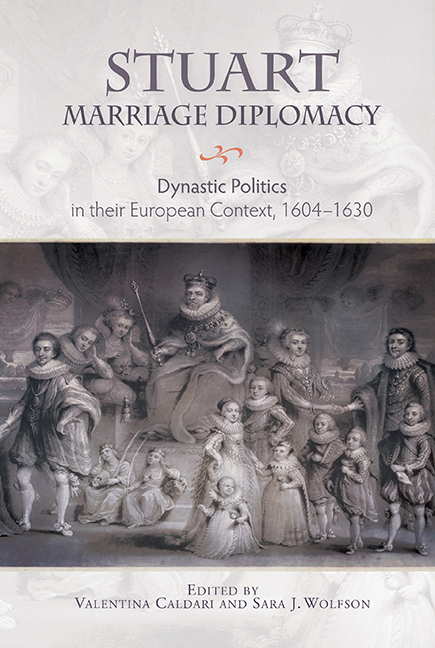Book contents
- Frontmatter
- Contents
- List of Illustrations
- List of Contributors
- Acknowledgements
- List of Abbreviations
- Introduction
- Part One Marriage and the Court
- Part Two Marriage and Politics
- Part Three Marriage and War
- Part Four Marriage and News
- 12 Secrecy, Counsel and Public Opinion during the Spanish and French Matches
- 13 The Spanish Match and Anglo-Dutch Publicity
- 14 ‘Whereof the world now stands in admiration’: Reporting on the Spanish Match from the Habsburg Netherlands
- Part Five Marriage and Continental Europe
- Part Six Marriage and Ceremony
- Bibliography
- Index
- Studies in Early Modern Cultural, Political and Social History
12 - Secrecy, Counsel and Public Opinion during the Spanish and French Matches
from Part Four - Marriage and News
Published online by Cambridge University Press: 24 October 2019
- Frontmatter
- Contents
- List of Illustrations
- List of Contributors
- Acknowledgements
- List of Abbreviations
- Introduction
- Part One Marriage and the Court
- Part Two Marriage and Politics
- Part Three Marriage and War
- Part Four Marriage and News
- 12 Secrecy, Counsel and Public Opinion during the Spanish and French Matches
- 13 The Spanish Match and Anglo-Dutch Publicity
- 14 ‘Whereof the world now stands in admiration’: Reporting on the Spanish Match from the Habsburg Netherlands
- Part Five Marriage and Continental Europe
- Part Six Marriage and Ceremony
- Bibliography
- Index
- Studies in Early Modern Cultural, Political and Social History
Summary
One of the most striking and novel features of the negotiations for the Spanish and French matches is that they took place in the context of an enlarged public sphere. The 1620s witnessed an explosion of spoken, written and printed news and political commentary in England, and the matches were negotiated in an atmosphere of intense public discussion. The growing volume of criticism of royal policies had led King James I to issue two proclamations against ‘excesse of Lavish and Licentious Speech of matters of State’ and to exhort his subjects in poetry to ‘hold your pratlinge, spare your penne / Be honest and obedient men’. Although marriage were traditionally part of the arcana imperii, their potential impact on matters of warfare, trade and religion that might affect the whole kingdom meant that James's demands largely fell on deaf ears.
This chapter will examine how James, Charles, and the duke of Buckingham responded to the desire of English subjects to know about, discuss and even criticize the Spanish and French match negotiations, and the consequences, both intended and unintended, of royal attempts to manage news and opinion. As we shall see, both sets of negotiations were conducted in an extraordinarily secretive manner. Opponents of the matches on the privy council and even in the localities had the potential to derail negotiations by showing how unpopular they were in England. Any unauthorized persecution of English Catholics would demonstrate to foreign powers that promises of toleration were unlikely to be kept. As such, the real or imagined views of the English political nation, or even a wider ‘public’ became centrally important issues in the negotiations. In their desire to stifle opposition in England, James, Charles and Buckingham excluded almost everyone, including privy councillors, from participation in, or even knowledge of, the negotiations. Their near-monopoly of information allowed them to make public pronouncements intended to create the (often misleading) impression that negotiations were proceeding well and that opponents of the matches were wasting their time.
Although attempts to restrict information about the negotiations were partially successful, they also backfired in ways that undermined royal authority.
- Type
- Chapter
- Information
- Stuart Marriage DiplomacyDynastic Politics in their European Context, 1604–1630, pp. 189 - 202Publisher: Boydell & BrewerPrint publication year: 2018
- 1
- Cited by

